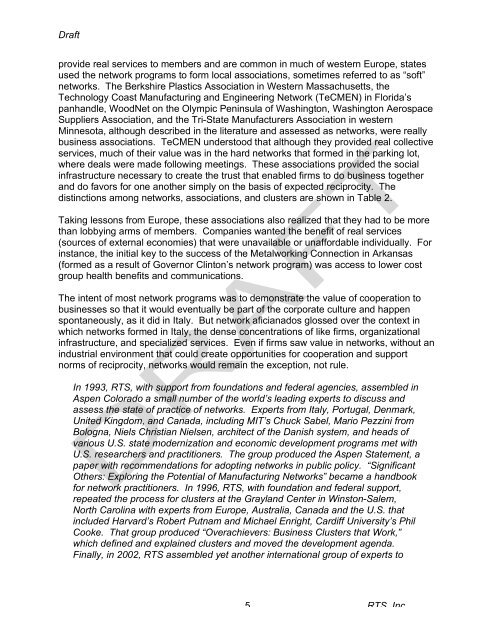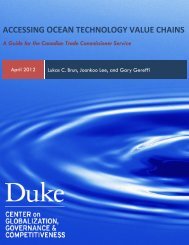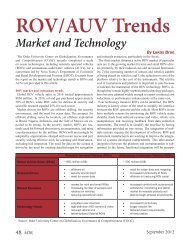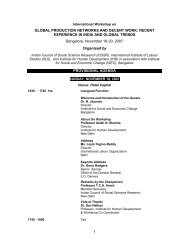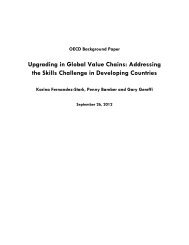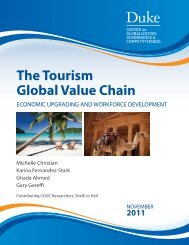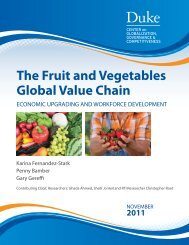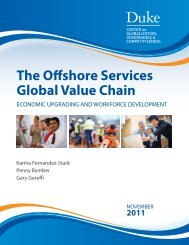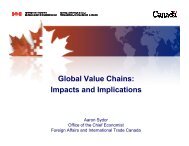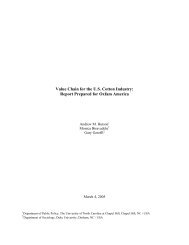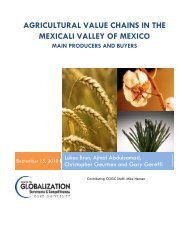Paper - Center on Globalization, Governance & Competitiveness
Paper - Center on Globalization, Governance & Competitiveness
Paper - Center on Globalization, Governance & Competitiveness
Create successful ePaper yourself
Turn your PDF publications into a flip-book with our unique Google optimized e-Paper software.
Draft<br />
provide real services to members and are comm<strong>on</strong> in much of western Europe, states<br />
used the network programs to form local associati<strong>on</strong>s, sometimes referred to as “soft”<br />
networks. The Berkshire Plastics Associati<strong>on</strong> in Western Massachusetts, the<br />
Technology Coast Manufacturing and Engineering Network (TeCMEN) in Florida’s<br />
panhandle, WoodNet <strong>on</strong> the Olympic Peninsula of Washingt<strong>on</strong>, Washingt<strong>on</strong> Aerospace<br />
Suppliers Associati<strong>on</strong>, and the Tri-State Manufacturers Associati<strong>on</strong> in western<br />
Minnesota, although described in the literature and assessed as networks, were really<br />
business associati<strong>on</strong>s. TeCMEN understood that although they provided real collective<br />
services, much of their value was in the hard networks that formed in the parking lot,<br />
where deals were made following meetings. These associati<strong>on</strong>s provided the social<br />
infrastructure necessary to create the trust that enabled firms to do business together<br />
and do favors for <strong>on</strong>e another simply <strong>on</strong> the basis of expected reciprocity. The<br />
distincti<strong>on</strong>s am<strong>on</strong>g networks, associati<strong>on</strong>s, and clusters are shown in Table 2.<br />
Taking less<strong>on</strong>s from Europe, these associati<strong>on</strong>s also realized that they had to be more<br />
than lobbying arms of members. Companies wanted the benefit of real services<br />
(sources of external ec<strong>on</strong>omies) that were unavailable or unaffordable individually. For<br />
instance, the initial key to the success of the Metalworking C<strong>on</strong>necti<strong>on</strong> in Arkansas<br />
(formed as a result of Governor Clint<strong>on</strong>’s network program) was access to lower cost<br />
group health benefits and communicati<strong>on</strong>s.<br />
The intent of most network programs was to dem<strong>on</strong>strate the value of cooperati<strong>on</strong> to<br />
businesses so that it would eventually be part of the corporate culture and happen<br />
sp<strong>on</strong>taneously, as it did in Italy. But network aficianados glossed over the c<strong>on</strong>text in<br />
which networks formed in Italy, the dense c<strong>on</strong>centrati<strong>on</strong>s of like firms, organizati<strong>on</strong>al<br />
infrastructure, and specialized services. Even if firms saw value in networks, without an<br />
industrial envir<strong>on</strong>ment that could create opportunities for cooperati<strong>on</strong> and support<br />
norms of reciprocity, networks would remain the excepti<strong>on</strong>, not rule.<br />
In 1993, RTS, with support from foundati<strong>on</strong>s and federal agencies, assembled in<br />
Aspen Colorado a small number of the world’s leading experts to discuss and<br />
assess the state of practice of networks. Experts from Italy, Portugal, Denmark,<br />
United Kingdom, and Canada, including MIT’s Chuck Sabel, Mario Pezzini from<br />
Bologna, Niels Christian Nielsen, architect of the Danish system, and heads of<br />
various U.S. state modernizati<strong>on</strong> and ec<strong>on</strong>omic development programs met with<br />
U.S. researchers and practiti<strong>on</strong>ers. The group produced the Aspen Statement, a<br />
paper with recommendati<strong>on</strong>s for adopting networks in public policy. “Significant<br />
Others: Exploring the Potential of Manufacturing Networks” became a handbook<br />
for network practiti<strong>on</strong>ers. In 1996, RTS, with foundati<strong>on</strong> and federal support,<br />
repeated the process for clusters at the Grayland <str<strong>on</strong>g>Center</str<strong>on</strong>g> in Winst<strong>on</strong>-Salem,<br />
North Carolina with experts from Europe, Australia, Canada and the U.S. that<br />
included Harvard’s Robert Putnam and Michael Enright, Cardiff University’s Phil<br />
Cooke. That group produced “Overachievers: Business Clusters that Work,”<br />
which defined and explained clusters and moved the development agenda.<br />
Finally, in 2002, RTS assembled yet another internati<strong>on</strong>al group of experts to<br />
5<br />
RTS, Inc.


